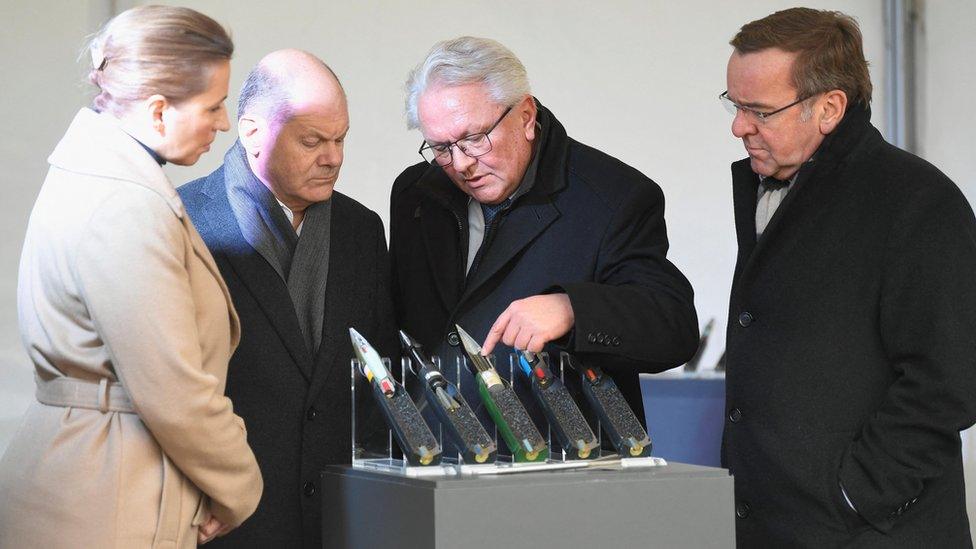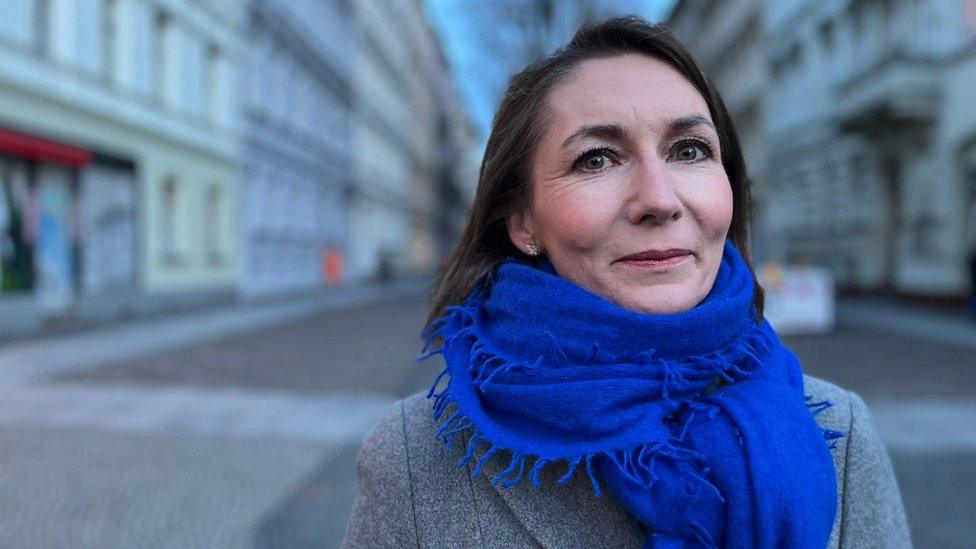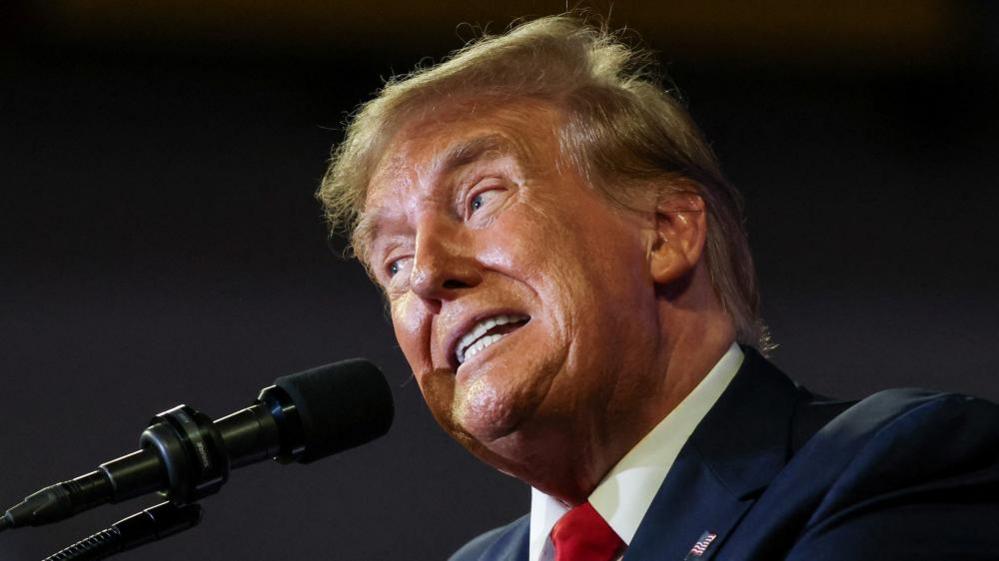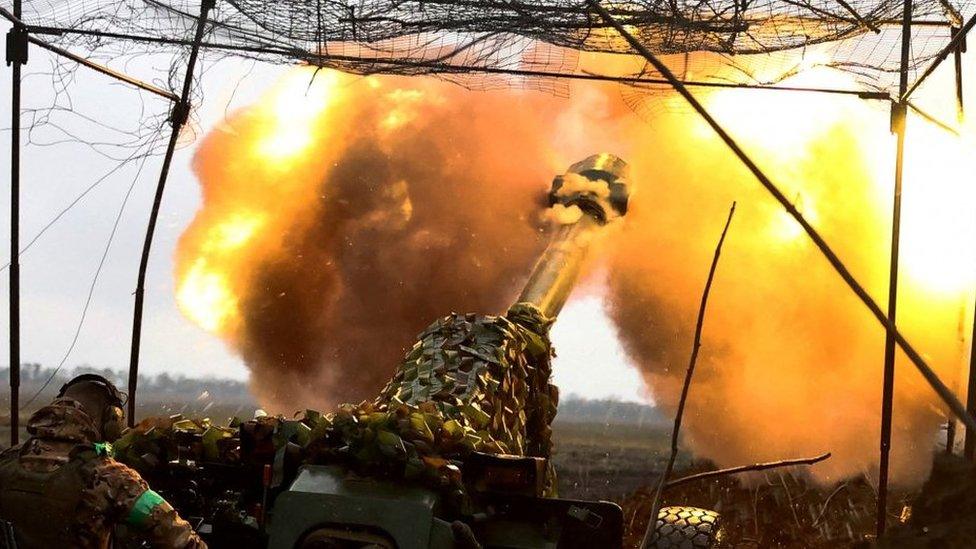Europe needs a decade to build up arms stocks, says defence firm boss
- Published

Danish PM Mette Frederiksen, German Chancellor Olaf Scholz, Defence Minister Boris Pistorius and CEO of Rheinmetall Armin Papperger visited the site of the new Rheinmetall factory in Lower Saxony
Europe will need 10 years before it is fully ready to defend itself, the boss of Germany's biggest defence firm, Rheinmetall, told the BBC.
Armin Papperger said that ammunition stocks are currently "empty".
He made the comments during a visit by Chancellor Olaf Scholz at a foundation-laying ceremony for a major new arms manufacturing plant in Lower Saxony.
Defence Minister Boris Pistorius and Danish Prime Minister Mette Frederiksen were also in attendance.
The comments come a day after comments by US presidential hopeful Donald Trump sparked fresh alarm in Europe.
The frontrunner for the Republican nomination said he once told a world leader he would not protect Nato members who don't pay their dues and would even "encourage" aggressors to "do whatever the hell they want".
The members of Nato - the North Atlantic Treaty Organization - agree that if one of them is attacked, all other nations should help it - which could include using armed force.
Rheinmetall has said it will invest more than $300m (£274m) in the new facility. It is eventually expected to produce 200,000 rounds of artillery shells annually.
Mr Papperger said that a "long time" would be needed to prepare against an "aggressor who wants to fight against Nato".
"We are fine in three, four years - but to be really prepared, we need 10 years," he said.
"We have to produce 1.5 million rounds [of ammunition] in Europe," Mr Papperger added. He said a vast amount of Europe's ammunition was sent to Ukraine, leaving little for European stocks.
"As long as we have war, we have to help Ukraine, but later we [will] need five years at a minimum and 10 years to really fill [ammunition stocks] up," he said.
Chancellor Scholz initially refused to say whether he was concerned about Mr Trump's comments, saying that he was "absolutely sure" that Nato was "of essence" for the US, Canada and European countries.
Later on Tuesday, he posted on X, formerly Twitter, describing Mr Trump's comments as "irresponsible and dangerous".
Asked by the BBC whether she thought that Europe needed to be ready to go at it alone if the US withdrew its support, Ms Frederiksen said Europe had to be ready "no matter what". She added that the "more and more aggressive Russia" was proof that Europe had to scale up.
"We have to speed up and that's the reason why I'm here today," she said.
It's nearly two years since Chancellor Scholz declared Zeitenwende - a turning point in Germany's foreign and defence policy - following President Putin's full-scale invasion of Ukraine.
There was widespread recognition that a "change through trade" policy with Russia had failed.
Allies had hoped that Germany, Europe's biggest economy, would take an increasingly assertive role in security and shed its traditional caution.

Dr Claudia Major says Europe would not currently be able to defend itself without the help of the United States
Yet in 2023, Germany was among a majority of Nato members who were forecast to miss the 2% spending target.
Berlin is expected to hit 2% in 2024 - but only through a one-off fund.
Europe has been investing more since Russia's full-scale invasion of Ukraine, says Dr Claudia Major from the German Institute for International and Security Affairs.
"But if we are very honest, we know that in the moment, in a conventional conflict, Europeans are not able to defend themselves without the support of the United States," she added.
She says "so much has been done" since Zeitenwende - but still not enough to confront the full spectrum of global security challenges.
Mr Papperger agreed that Zeitenwende is "not only a word" and believes trust between government and defence contractors has improved.
Rheinmetall's share price has steadily risen since Russia's full-scale invasion of Ukraine.
Germany's past hangs heavy over this debate, as rearmament led to catastrophic conflicts in the 20th Century.
While no one knows what will happen in the US election this year, Mr Trump's latest comments are being described as a wake-up call for all of Europe - although it could hardly be described as the first.
Related topics
- Published11 February 2024

- Published3 October 2023
